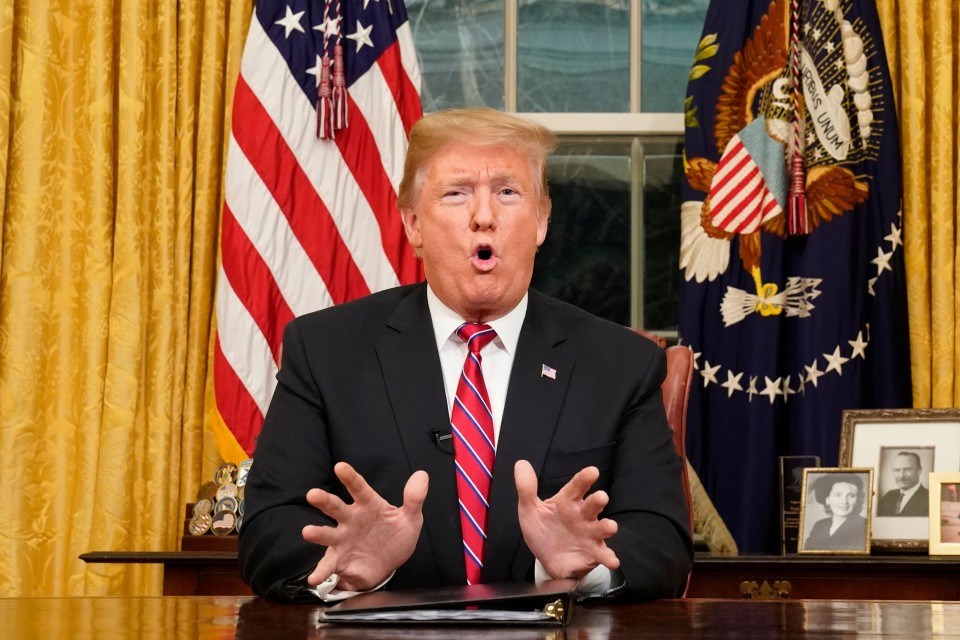Michael Ignatieff is the president of the Central European University in Budapest and author of “Blood and Belonging: Journeys into the New Nationalism.” He was the leader of the Liberal Party of Canada from 2008 to 2011.
President Trump is proud to call himself an American nationalist. His shutdown of the U.S. government to force funding for a border wall is classic nationalist politics. He’s invented a “national security crisis,” even though there is no evidence of such a thing. In his address Tuesday night, Trump, like all nationalists, invented an enemy. He once again portrayed Latino migrants as rapists and murderers and painted his Democratic opponents as weaklings who won’t protect the American people.
“The only thing that is immoral is for the politicians to do nothing and continue to allow more innocent people to be so horribly victimized,” Trump intoned during his speech before rattling off a series of gruesome stories about Americans who have been brutally murdered by illegal immigrants.
As Trump’s fear-mongering strategy continues, going forward into 2020, the Democrat-controlled U.S. House of Representatives and presidential candidates like Elizabeth Warren will need to think carefully about how to counter Trump’s politics of fear and the nationalism that allows him his grip on the Republican base.
It may look like the easy solution is to craft an inclusive “civic nationalism” to compete with the “ethnic nationalism” that has brought Trump to power and that is doing so well globally. But it is worth thinking about progressive electoral victories of the recent past. They were all firmly rooted in an inclusive nationalist appeal. And yet, they fell short.
In 2004, at the Democratic National Convention, Barack Obama deftly turned his own life story into a national fable about “the only country where my story is even possible.” In the 1990s, Bill Clinton, highlighting his humble beginnings on his path to the presidency, recounted how he was raised by a single mother in “a town called Hope.” Around that same time, Tony Blair pushed an image of “Cool Britannia,” playing on deep-seated myths about Britain as the workshop of the world. Through his party, La République En Marche!, French President Emmanuel Macron refurbished Charles De Gaulle’s vision of a Jupiterian state that would modernize the nation.
Each of these leaders presented an inclusive vision of a modern nation in control of its destiny. What eventually sank these progressive narratives was not that they lacked nationalist appeal but that their narratives ran smack up against inequalities that nationalism can’t paper over.
Blair’s Cool Britannia concept won him voters in London and in the country’s south, but his civic nationalism sounded like metropolitan arrogance for swathes of voters in the decaying industrial heartlands. Obama’s “more perfect union” appealed across racial divides, but many white working-class Americans didn’t see themselves reflected in the entitled grandees who filled his administration.
Instead, they went for Trump’s ethnic nationalism — promising a wall blocking migrants — because it spoke so unashamedly to whites threatened by a civic nationalism that seemed to exclude them. Now, ethnic nationalism faces the same test that civic nationalism failed: dealing with the economic inequalities that split nations apart. Right-wing nationalists have no real economic solutions to appease the anger that brought them to power. In fact, Trump’s first major economic measure — a tax cut — will worsen inequality, given that it primarily benefits the top 1 percent.
In response, progressives must realize that inclusive, hopeful nationalism is not enough. They must craft a rallying appeal that is just as inclusive but considerably tougher in attacking the inequalities that keep people apart. Being tougher means making some enemies — corporations that don’t pay their fair share of taxes, employers that cheat and overwork their employees, and big corporate polluters that wreck the environment.
Attacking corporate tax avoidance, raising taxes on the rich and using the revenue to rebuild public services like roads, schools, hospitals and airports is an agenda that a lot of people will vote for — but one that a lot of people with power and influence will oppose. It is not a middle-of-the-road agenda. Trump understands that people will vote for a fighter. Progressives and liberals need to learn that lesson.
The trouble with Trumpian nationalism on the right is that the “enemies” it preys on are the weak, including migrants. The trouble with nationalism on the left is that so far it has been afraid to make enemies among the strong. But doing so will be the test of its credibility with the vulnerable electorate it needs to win over.
This was produced by The WorldPost, a partnership of the Berggruen Institute and The Washington Post.



